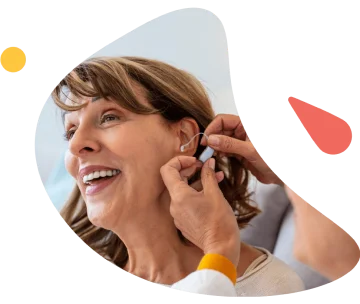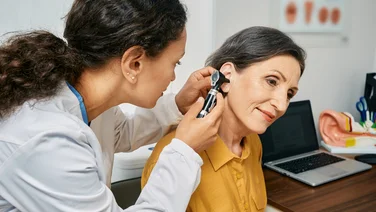If you’re experiencing difficulty hearing, or you’re concerned about a loved one who’s struggling to keep up with conversations, you might have lots of questions.
Hearing loss can happen for a variety of reasons. Some types of hearing loss can be temporary and treatable, while others are permanent and may gradually worsen over time.
Sudden hearing loss in one ear or both ears is a medical emergency, and if you experience it you should seek medical advice straight away.
Around 37.5 million adults in the US report they have hearing problems – that’s around 15% of the population. Half of people aged 75 and older have disabling or severe hearing loss.
There are three main types of hearing loss:
- Sensorineural hearing loss
- Conductive hearing loss
- Mixed hearing loss
Each type affects a different part of the auditory system – the body’s system that’s responsible for our sense of hearing and how we understand sounds.
Hearing loss can be caused by advancing age, exposure to loud noise, genetics, a blockage in the ear, and infections, among other things.
Depending on the type and cause of hearing loss, treatments may be available, the most common being hearing aids.
What is hearing loss?
Hearing loss is when you can’t hear as well as someone with ‘normal’ hearing. Sound is measured in decibels (dB), and you are said to have very slight or mild hearing loss if you cannot hear sound below 15-20 dB.
- Breathing 10dB
- Whispering 30dB
- Conversation 60dB
- Washing machine 70dB
- Motorcycle 95dB
- Dog barking close to ears 110dB
Data sourced from the CDC
Hearing loss happens when sound signals don’t reach the brain. To understand how and why, it helps to know a little bit about the auditory system and how hearing works.
The auditory system is responsible for our sense of hearing and how we understand sounds. It includes the ears, the nerve connecting the inner ear to the brain, and parts of the brain that process sound.

The ear is made up of three sections:
- The outer ear
- Middle ear
- Inner ear
Sound is made when something vibrates and causes the air around it to vibrate. These vibrations cause the energy in the air to move in a pattern, creating a sound wave.
Sound waves enter the ear canal and travel to the eardrum, causing the eardrum and the tiny bones in the middle ear – the ossicles – to vibrate.
The vibrations, in turn, pass to the inner ear and the cochlea, a hollow, snail-shaped structure that’s filled with fluid and lined with thousands of tiny hair cells.
The hair cells then convert the vibrations into electrical impulses that travel through the auditory nerve to the brain. The brain interprets these electrical impulses as sounds.
When we experience any degree of hearing loss, it’s because something has gone wrong somewhere in the auditory system.
Types of hearing loss
The three main types of hearing loss are sensorineural hearing loss, conductive hearing loss, and mixed hearing loss.
Sensorineural hearing loss
This occurs as a result of damage to a part of the inner ear or the auditory nerve. Often, sensorineural hearing loss is caused by damage to the tiny hair cells in the cochlea, which means they are unable to convert sound waves into electrical impulses.
There is usually no treatment or cure for sensorineural hearing loss. In fact, it’s the most common type of permanent hearing loss. However, if you do have sensorineural hearing loss, wearing a hearing aid will usually help you to hear better.
- Exposure to loud noise, called noise-induced hearing loss
- Ageing, called presbycusis
- Head injury or trauma
- Infection or illness
- Genetics (when hearing loss runs in the family)
- Ototoxic medication (drugs that have an adverse effect on hearing or balance)
- Malformation of part of the inner ear
- Abnormal bone growth in the inner ear (otosclerosis)
- Meniere’s disease
- Tumours (this is rare)
Sudden hearing loss is sensorineural, usually occurring immediately or over a few days for no obvious reason.
You might notice it when you wake in the morning or when you put a phone to the affected ear. You may even experience a ‘pop’ sound or sensation just before the sound goes.
In around 85-90% of cases, the cause of sudden hearing loss can’t be found. Where identified, causes include head trauma, autoimmune or neurological disease, ototoxic medication, tumor(s), circulatory problems, or inner ear disorders like Meniere’s disease.
If you experience sudden hearing loss, you should seek medical advice straight away. Getting diagnosed and treated quickly will improve your chances of recovering at least some of your hearing.
Conductive hearing loss
This occurs when soundwaves are blocked from moving through the outer or middle ear, stopping sound from reaching the inner ear.
It occurs as a result of a problem with, or damage to, part of the outer or middle ear, which includes the ear canal, eardrum, and the ossicles – the three tiny bones in the middle ear that pass soundwave vibrations to the cochlea in the inner ear.
Most cases of conductive hearing loss are treatable, either with medication or surgery and, depending on the exact cause, some types of hearing aids.
- Blockage in the ear canal, including ear wax or objects stuck in the ear canal
- Fluid in the middle ear, which can be caused by a cold or virus
- Otitis media (middle ear infection)
- Otitis externa (infection in the external ear canal, often called ‘swimmer’s ear’)
- Perforated or damaged eardrum
- Otosclerosis (abnormal bone growth around the ossicles)
- Problem with the Eustachian tube, which connects the ears with the nose
- Malformation of the outer or middle ear
- Benign (non-cancerous) tumor
Mixed hearing loss
As the name suggests, mixed hearing loss occurs when you have a combination of conductive hearing loss and sensorineural hearing loss. This can happen if you have sensorineural hearing loss and also develop a problem with your conductive hearing.
For example, you might also have a degree of noise-induced hearing loss and then develop an infection that causes a build-up of fluid in your middle ear.
Again, hearing aids can help to improve mixed hearing loss, although it’s important that any treatable factors are also managed. In the above example, you might be prescribed antibiotics or other medication to treat the infection.
Auditory neuropathy
This is a lesser-understood type of hearing loss, and the percentage of people it affects is unknown.
In this type of hearing loss, the inner ear detects and processes soundwaves, but there is a problem when they are transmitted from the inner ear to the brain.
If you have auditory neuropathy, you might appear to have normal hearing or very mild hearing loss when it’s assessed during a hearing test. On the other hand, you could have quite severe hearing loss.
Either way, you’re likely to have difficulty with speech perception and understanding.
Researchers are continually investigating auditory neuropathy to improve understanding and diagnosis.
Hearing loss symptoms
Many people don’t realize they have hearing loss because it happens gradually and over a long period of time. Often, loved ones notice the signs of hearing loss before you recognize anything is different.
Hearing loss in children and babies will manifest differently and have different signs. But in teens and adults, hearing loss signs include:
- Trouble hearing people speaking, especially in crowded, noisy places
- Having to ask people to repeat themselves or to talk slower
- People’s voices sounding muffled
- Having to turn the volume up on the TV or radio more and more
- Struggling to distinguish consonant sounds
- Finding it difficult to hear while on a phone call
- Avoiding social situations or becoming increasingly isolated because you find it difficult to keep up with conversations
- Getting tired or stressed as you’re having to focus more while listening

You might feel embarrassed or uncomfortable at the prospect of losing your hearing. But it’s important to remember that the sooner you have your hearing tested and the cause of your hearing loss is diagnosed, the more likely it is to be successfully treated and better managed.
Degrees of hearing loss
Hearing loss is often categorized as mild, moderate, severe, or profound. It can be measured according to how loud sound needs to be for you to hear it, known as hearing loss range (decibel hearing loss, or dBHL).
Mild hearing loss
Hearing loss range is 20-40 dBHL. You have difficulty hearing soft or high-pitched speech and distinguishing some consonant sounds. You might not be able to hear the noise of a refrigerator or water in a stream.
Moderate hearing loss
Hearing loss range is 41-70 dBHL. As well as the above, you find it harder to hear vowel sounds and might struggle to understand speech without a hearing aid. For example, you might not hear if it’s raining, or other people working in the office.
Severe hearing loss
Hearing loss range is 71-95 dBHL. You can’t hear speech without hearing aids or a cochlear implant. You probably won’t hear the phone or doorbell ringing, the sound of traffic, or when a vacuum cleaner is being used.
Profound hearing loss
Hearing loss range is 95 dBHL or higher. Without hearing aids, you might be unable to hear very much at all. It’s likely you won’t be able to hear if someone shouts at you, the noise of aeroplanes above, or fire alarms.
Diagnosing hearing loss
If you think you have hearing loss, the first step is to visit an audiologist. They will perform some hearing tests to assess the degree of hearing loss and identify any potential causes.
The outcomes of these tests will help determine the best treatment.
Hearing loss treatment
Depending on the type and cause of hearing loss and its severity, it can be treated in different ways.
If you have conductive hearing loss caused by a build-up of wax, for example, you can have treatment (microsuction or water irrigation) to remove the wax. If you have an infection that’s causing your hearing loss, your doctor might prescribe antibiotics.
In some cases, more invasive treatment is needed for conductive hearing loss. Surgery can often correct congenital malformations of parts of the ear or any damage suffered by structures in the middle ear as a result of head trauma.
Some cases of sensorineural hearing loss can be managed with medication. For example, if an underlying health condition is a cause – an autoimmune disease, Meniere’s disease, or a viral infection – treatment of the condition will often remedy or minimize the impact of your hearing loss.
However, most cases of sensorineural hearing loss cannot be treated medically and you will need to wear a hearing aid to improve your hearing. Hearing aids are also recommended for some people with conductive hearing loss.
If hearing aids don’t work or you don’t get any significant improvement, then, depending on the cause of your hearing loss, you might be a candidate for a cochlear implant.Ringing in the ears is called tinnitus. It isn’t a disease or a condition, but a symptom of something else, usually an underlying problem with the auditory system or the vestibular system.
If you have tinnitus, you might experience the sound as buzzing, humming, whistling, clicking or whooshing. In around 90% of cases, tinnitus is associated with hearing loss of some kind.In the US, it is recommended that adults have a routine hearing test every 10 years until they’re 50, and every three years thereafter.
Regardless of your age, if you’ve noticed a difference in your hearing – you’re turning up the volume on your TV more often, people are having to speak louder for you to hear them, or if your ear feels full or clogged for no obvious reason – it might be time to have your hearing tested.
Hearing loss FAQs
Why do I hear ringing in my ears?
Ringing in the ears is called tinnitus. It isn’t a disease or a condition, but a symptom of something else, usually an underlying problem with the auditory system or the vestibular system.
If you have tinnitus, you might experience the sound as buzzing, humming, whistling, clicking or whooshing. In around 90% of cases, tinnitus is associated with hearing loss of some kind.
Should I have my hearing checked?
In the US, it is recommended that adults have a routine hearing test every 10 years until they’re 50, and every three years thereafter.
Regardless of your age, if you’ve noticed a difference in your hearing – you’re turning up the volume on your TV more often, people are having to speak louder for you to hear them, or if your ear feels full or clogged for no obvious reason – it might be time to have your hearing tested.








